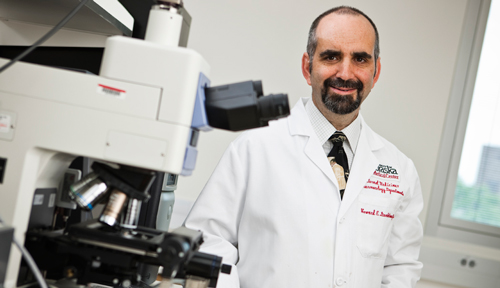The Nebraska Neuroscience Alliance at UNMC is embarking on a translational clinical trial using Leukine, a drug used to boost the immune system in cancer patients, to test a unique immune therapy in people with Parkinson’s disease.
The NNA unites three of UNMC’s top neuroscience programs — the departments of neurological sciences and pharmacology and experimental neuroscience, as well as the Munroe-Meyer Institute.
Parkinson’s disease is caused by the loss of neurons that produce dopamine, a nerve-signaling chemical which controls movement and balance. About a million people in the United States and more than 4 million people worldwide have the disease.
Video: Howard Gendelman, M.D., discusses the study here.
Degeneration and loss of these dopamine-producing neurons typically occur after age 60, and it is estimated that one person in 20 over the age of 80 has Parkinson’s.
|
|
Neurodegeneration occurs when a normal protein, called alpha synuclein, clumps, changes shape, and accumulates in the brain. The accumulation of protein clumps alerts the immune system, which launches an attack, causing inflammation and eventual destruction of dopamine-producing nerve cells.
“The project is a collaboration between neurologists and neuroscientists,” said Howard Gendelman, M.D., principal investigator and chair of the UNMC Department of Pharmacology and Experimental Neuroscience.
Specifically , “the study will determine whether the drug Leukine can transform the immune system in Parkinson’s disease from one that causes harm to the brain to one that protects it, elicits nerve cell repair and ultimately affects disease symptoms,” said R. Lee Mosley, Ph.D., a co-principal investigator and associate professor in pharmacology and experimental neuroscience.
In a year-long, double-blind clinical trial, beginning this fall, 16 patients will be monitored using magnetoencephalography (MEG) imaging to pinpoint those areas of the brain affected by the disease and determine if Leukine works.
This is the first time MEG has been used to monitor Parkinson’s disease and the effects of a treatment, said Tony Wilson, Ph.D., an assistant professor in pharmacology and experimental neuroscience.
If this therapy is useful, Dr. Gendelman said, it sets the stage for more comprehensive studies looking at the effectiveness of other potential vaccine and immune changing therapies.
“Since current therapies have not led to a breakthrough, it is certainly worthwhile to consider new approaches,” said John Bertoni, M.D., Ph.D., a professor of neurological sciences and director of the Parkinson’s clinic at UNMC. “This is the first step and we are cautiously optimistic, but we will need to analyze the information we gain very carefully.”
